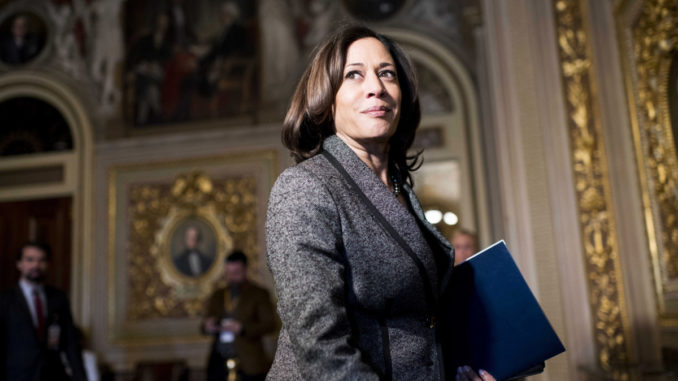

California Democratic Sen. Kamala Harris
Bill Clark/Congressional Quarterly/ZUMA Press
The uproar over Wisconsin’s primary and the joy emanating from voting-rights advocates over the Texas decision are both signs that the question of how America will vote for a president in November is becoming the urgent priority that it needs to be. In the wake of both, Kamala Harris, a rumored consideration for the vice presidential spot on presumptive Democratic nominee Joe Biden’s ticket, is offering a sweeping new proposal designed to solve this massive problem all at once.
Speaking with Rolling Stone about the $5 billion legislation, the former presidential candidate said “this is about making sure that in our country, no one should have to decide about their right to vote versus their health.” In addition to the short-term fixes for 2020, Harris added that the bill offers pathways to modernize how our states help deliver greater ballot access to disabled Americans, to indigenous tribes, and to those who speak English as a second language.
Sonia Gill, a senior legislative counsel with the ACLU, said that the bill’s elasticity was one of its key selling points. “There needs to be an approach from Congress that acknowledges the variances and existing state laws, and permits states the flexibility to serve their voters,” Gill said. “We firmly believe that this bill does that.”
Along with continued prosecution of suppressive laws and long-overdue fixes to a Voting Rights Act that was maimed by the 2013 Shelby County v. Holder Supreme Court decision, Harris called for a national implementation of vote-by-mail. However, the senator recognized that some voters, particularly those in marginalized groups targeted by voter suppression, may be resistant to trust putting their ballots in the mail and would instead chance a trip to the polls — and the lines that come from them.
President Trump has falsely labeled voting by mail as “corrupt,” even as he does it himself. However, he has already lost a large degree of that fight. All six of the key swing states in the fall election — Pennsylvania, Florida, Arizona, North Carolina, Michigan, and the aforementioned Wisconsin — permit their residents to cast a ballot by mail for any reason. But a number of those states, along with more-conservative battlegrounds like Iowa and Maine, may face attacks from state lawmakers on their vote-by-mail laws. In addition, there may be no adequate mail service to deliver those votes, as the U.S. Postal Service may become insolvent by the end of September if Trump continues to refuse a bailout.
The Postal Service’s issues are but one reason why the senator doesn’t regard vote-by-mail as a panacea for the problems presented by the coronavirus pandemic. Like Harris, Gill also emphasized to Rolling Stone the importance of expanding the number of in-person voting sites, noting that “for large groups of voters, particularly vulnerable voters, it sometimes is the only option they can exercise.”
But even if the bill made it through the Republican-controlled U.S. Senate, one major obstacle that Harris faces is the president, who is unlikely to sign onto any expansion of the voting franchise. He said during a late-March Fox News appearance that “you’d never have a Republican elected in this country again” if Democrats had gotten their voting-rights wish list in the first relief bill.
Harris doesn’t believe that this bill may be doomed, but allowed that it could serve as a template for states to file their own similar pieces of legislation. “Absolutely. Absolutely. Absolutely,” Harris said. “And that’s why I’ve worked so closely with the California Secretary of State Alex Padilla and others. This is doable. And I think that there are these moments of a crisis that give us the courage and encouragement to try something that actually may be better than how we were doing it before.”

Be the first to comment